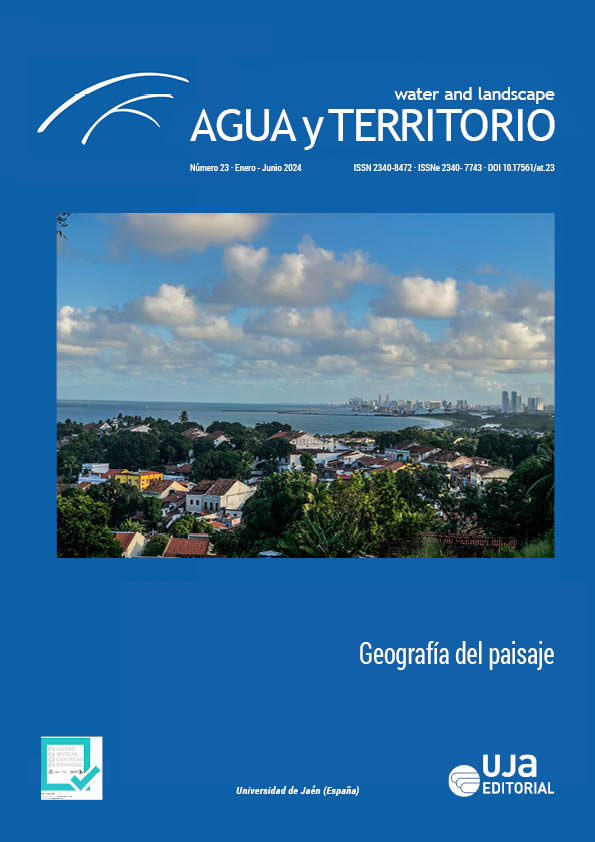Entorno Institucional y mercado del agua embotellada en México en tiempos del Covid-19
DOI:
https://doi.org/10.17561/at.23.6531Palabras clave:
Entorno Institucional, Agua Embotellada, Gestión del Agua, Incentivos Institucionales, Insumos InstitucionalesResumen
En México la incertidumbre debido a la falta de información de la calidad del agua potable ha provocado un alto consumo de agua embotellada. Entender y encontrar su prevalencia requiere conocer el entorno institucional y cómo ha favorecido el desarrollo del mercado del agua embotellada y ha generado cambios en las preferencias en tiempos de Covid-19. Para entender el entorno institucional utilizamos tres conceptos: incentivos institucionales, insumos institucionales y demandas institucionales, que permiten interpretar la evolución y permanencia de un mercado de 20 mil millones de pesos, que se mantiene en tiempos de pandemia y dificultades económicas en buena parte de la población, que no ha dejado de consumir agua embotellada, pero ha cambiado sus preferencias.
Descargas
Referencias
Acemuglu, D.; Robinson, J. 2012: Por qué fracasan los países: Los orígenes del poder, la prosperidad y la pobreza. Barcelona (España), Crítica.
Aoki, M. 2007: “Endogenizing Institutions and Institutional Changes”. Journal of Institutional Economics, 3 (1), 1–31. DOI: 10.1017/S1744137406000531
Asociación de Empresas de la Industria del Plástico. 2021: El Covid-19 disminuyó un 40 % las ventas de agua en México. http://www.clusterplasticos.org/el-covid-19-disminuyo-un-40-las-ventas-de-agua-embotellada-en-mexico/ Consulta realizada el 22 de abril de 2021.
Caballero, G.; Kingston, C. 2009: “Comparing theories of institutional change”. Journal of Institutional Economics, 5 (2), 151–180. DOI: https://doi.org/10.1017/S17441374090001283
Denzau, A.; North, D. 1994: “Shared Mental Models: Ideologies and Institutional”. International Review for Social Sciences, 47 (1), 3–31. DOI: https://doi.org/10.1111/j.1467-6435.1994.tb02246.x
El Economista. “Un alto porcentaje de purificadoras de agua en la CDMX incumplen estándares”. https://www.eleconomista.com.mx/arteseideas/Un-alto-porcentaje-de-purificadoras-en-la-CDMX-incumple-estandares-20200820-0117.html Publicado el 20 de agosto de 2020.
El Financiero. “El Covid-19 tira a 40% las ventas de agua embotellada en México”. https://www.elfinanciero.com.mx/empresas/covid-19-tira-hasta-40-las-ventas-de-agua-embotellada-en-mexico-en-2020/ Publicado el 24 de marzo de 2021.
Furusten, S. 2013: Institutional Theory and Organizational Change. Cheltenham (United Kingdom), Edward Elgar Publishing.
Instituto Nacional de Estadística y Geografía (INEGI). 2019: Directorio Estadístico Nacional de Unidades Económicas (DENUE). https://www.inegi.org.mx/app/mapa/denue/ Consulta realizada el 25 de marzo de 2020.
Instituto Nacional de Estadística y Geografía (INEGI). 2020: Encuesta Nacional de Ingeso Gasto en los Hogares (ENIGH). https://www.inegi.org.mx/programas/enigh/nc/2020/ Consulta realizada el 24 de marzo de 2021.
La Jornada. “México, el mayor consumidor de agua en el mundo”. https://www.jornada.com.mx/notas/2021/04/02/economia/mexico-el-mayor-consumidor-de-agua-embotellada-en-el-mundo/ Publicado el 2 de abril de 2021.
Matés-Barco, J.M; Rojas-Ramírez, J.J.P. (Eds.). 2018: Agua y servicios públicos en España y México. Jaén, UJA Editorial, y Universidad de Guadalajara (México), 293 págs.
Montero, D. 2015: Transnacionales, gobierno corporativo y agua embotellada. El negocio del siglo XXI. Ciudad de México (México), Ediciones Del Lirio-UAM-I.
Montero, D. 2019: Instituciones y actores. Un enfoque alternativo para entender el consumo de agua embotellada en México. Ciudad de México (México), UAM-I-Tirant Humanidades.
Montero, D. et al. 2011: Encuesta sobre Hábitos de Consumo, Servicio y Calidad del agua por hogar en el Distrito Federal, 2011. Ciudad de México (México), ICyTDF.
Montero, D.; Cardoso, J. 2016: “El agua embotellada y los contenedores de plástico. ¿Qué tan confiables son?”. Boletín de la Sociedad de Química de México, 10 (2), 22–26. http://bsqm.org.mx/pdf-boletines/V10/V10N2/7_Agua_Potable_2016_2.pdf
Ostrom, E. 2005: Understanding Institutional Diversity. Princeton (United States), NJ, Princeton University Press.
Publimetro.com “México incrementó 30% el consumo de productos ultraprocesados”. https://www.publimetro.com.mx/mx/nacional/2021/02/03/mexico-incremento-30-el-consumo-de-productos-ultra-procesados.html Consulta realizada el 3 de febrero de 2021.
Rodríguez, L. 2017: “Demanda de agua potable de calidad crea lucrativo negocio en la Ciudad de México”. http://www.cronica.com.mx/notas/2017/1025182.html Consulta realizada el 17 de mayo de 2017.
Zhihua, Hu. et al. 2011: “Bottled Water: United States Consumer and their Perceptions of Water Quality”. International Journal of Environmental Research and Public Health, 8(2), 565–578. DOI: https://doi.org/10.3390/ijerph8020565
Publicado
Número
Sección
Licencia
Derechos de autor 2023 Delia Montero Contreras, Jorge Hernández Gutiérrez

Esta obra está bajo una licencia internacional Creative Commons Atribución 4.0.
© Universidad de Jaén
Los originales publicados en las ediciones impresa y electrónica de esta Revista son propiedad de la Universidad de Jaén siendo necesario citar la procedencia en cualquier reproducción parcial o total.
Salvo indicación contraria, todos los contenidos de la edición electrónica se distribuyen bajo una licencia de uso y distribución “Creative Commons Reconocimiento 4.0 España” (CC-by). Puede consultar desde aquí la versión informativa y el texto legal de la licencia. Esta circunstancia ha de hacerse constar expresamente de esta forma cuando sea necesario.














